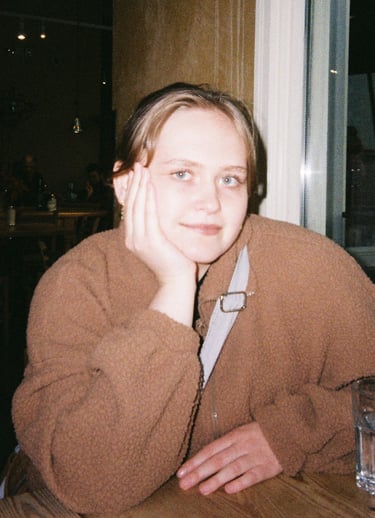
Noelle Hendrickson is a poet proudly based in Salt Lake City. She recently graduated from Utah Valley University's creative writing program; there, she worked as Editor-in-Chief of the literary journal Touchstones. She has also studied at the New York State Summer Writers Institute. Her poetry has been published in several literary journals, including but not limited to: Whale Road Review, The Westchester Review, Furrow, Prism Review, Watershed Review, The Allegheny Review, Arkana, and Queerlings Magazine. She has received honors from judges such as Richie Hofmann, Darlene Young, and Lip Manegio.
Noelle's other past activities include: leading a weekly writing class for autistic adults in Provo, Utah (which included planning lessons, holding workshops, and emphasizing student interests), researching lesbian history, presenting on disability poetics, teaching English, and being a member of Rock Canyon Poets.
In real life, she identifies as a grown-up Junie B. Jones, loves her amazing partner, and thrives on vanilla chai.


I was astonished by this poem's handling of its subjects—a poem that charges autobiography with fantasy, beauty, and terror. It's also a poem that understands so well that emotions are to be found in specific images: the trees, the burning lawn, the whole landscape stands in for the interior feelings of the speaker remembering a crisis. I won't soon forget the way this poem urges us to reflect on what's natural and about what and who gets lost in our destructive need for control.
Richie Hofmann's comments on the poem "Cardinal" after awarding it first place.
In “On Wednesday, You Led Me,” we as an audience aren’t sure what this moment on a specific Wednesday in a specific shop means, but we feel its weight through the way the speaker returns to it, holds it up against later events. In it, two people who are coming to know each other broach topics like a dance, push and pull over what seems a small purchase decision but might be symbolic in the assessment of the relationship. The mystery of what we don’t know about this relationship is balanced with specific sensory details—of the language (“slicked and salvable,” “catching and calling”), of the images (vowel-shaped candles, blue paint, copper skies), all inviting us into the experience of the poem. This is how a meaningful relationship feels: particular, visceral and tender—and yet abstract and enigmatic.
Darlene Young's comments on the poem "On Wednesday, You Led Me" after awarding it first place.
The difficulty of the first few lines pays off greatly as the reader comes to understand the speakers dilemma— the pain she feels about and her need to accept her lesbian sexuality. The poem moves from this uncertainty to genuinely realized happiness. And the surprising imagery is another pleasure of the poem. For example, closeness that is "cold-hardy and summer-staining" and "the barren ribs of a fish, / the white arches spread like seagulls / at a distance."
Susan Elizabeth Howe's comments on the poem "Sodomite" after awarding it second place.
It is not clear, in a poem that ends with the image of being scathed, what is “gentle” and what should be. These anonymous characters who swim naked together—who are they? Despite leaving so much unsaid, “How to Be Gentle” affects. Much of the experience of the poem comes through contrast. Sharp things--the heat, the rocks--appear against soft things--the rippling fields, the fish that slip against skin (with beautiful, wet s sounds), the curving light. Noise and white space, heat and coolness; the distance of the lilac-covered mountains and the jagged particularity of sharp rocks. All of this, stacked together, gives us a glimpse of the eternal “everything” within a specific, keenly present “here around us.”
Darlene Young's comments on the poem "How To Be Gentle" after awarding it second place.
